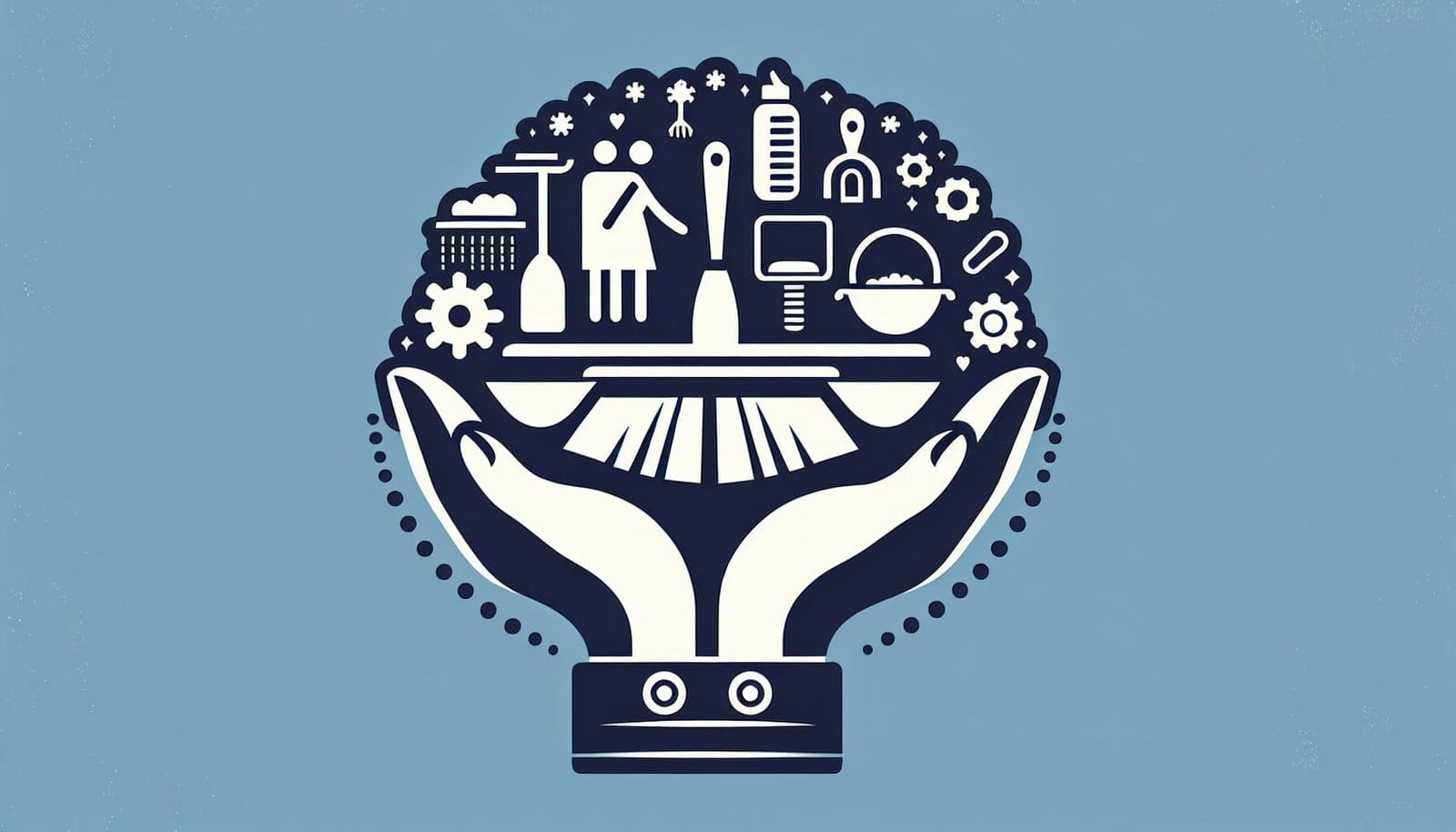In today's fast-paced world, balancing work, family, and household responsibilities can often feel like a never-ending juggling act. As parents, the pressure to excel in our careers while still being present for our family can be overwhelming. However, instead of shouldering this burden alone, it is essential to encourage our partners and family members to share in the responsibilities and contribute to household management. In this article, we will explore the challenges faced by remote working parents and provide practical solutions for promoting a more balanced and shared approach to household duties. Together, we can create a harmonious and supportive environment where everyone plays a role in maintaining a well-managed home.

Challenges Faced by Parents in Juggling Responsibilities
Lack of time
As parents, we often find ourselves wishing for more hours in a day. Between taking care of our children, managing household tasks, and pursuing our own interests and careers, time seems to slip away from us. The lack of time can feel overwhelming and can lead to added stress and anxiety.
Fatigue and burnout
Juggling multiple responsibilities can leave us feeling exhausted and burnt out. It's no secret that parenting requires a tremendous amount of physical and emotional energy. When we're constantly on the go, meeting the needs of our children and managing household tasks, it's easy to neglect our own self-care and well-being.
Emotional and mental strain
The constant demands of parenting and managing responsibilities can take a toll on our emotional and mental well-being. It's natural to experience moments of frustration, stress, and even guilt. The weight of these emotions can impact our personal relationships and overall happiness.
Impacts on personal and professional life
Balancing parenting responsibilities with personal and professional commitments can be challenging. It's common to feel torn between attending to our children's needs and meeting our own goals and aspirations. This can lead to a sense of imbalance and dissatisfaction in both our personal and professional lives.
The Importance of Sharing Responsibilities
A balanced and healthy household
Sharing responsibilities within the household is essential for creating a balanced and healthy environment. When both partners contribute to parenting tasks and household chores, the workload is distributed more evenly, allowing for a fair division of labor. This promotes a greater sense of harmony and cooperation within the family.
Reduced stress and increased well-being
Sharing responsibilities can alleviate the burden of constantly feeling overwhelmed and stretched thin. When each partner takes an active role in managing the household, it reduces the overall stress levels for everyone involved. This, in turn, leads to increased well-being and a more positive atmosphere at home.
Enhanced relationship dynamics
By sharing responsibilities, we strengthen the bond between partners and promote healthier relationship dynamics. When both individuals are actively involved in the day-to-day tasks of parenting and running a household, it fosters a sense of teamwork and respect. This collaboration and communication can deepen the connection between partners.
Improved work-life balance
Sharing responsibilities allows us to achieve a better work-life balance. When both partners are actively involved in parenting and household management, the load is lessened for each individual. This provides more time and energy to dedicate to personal and professional pursuits, leading to a greater sense of fulfillment and satisfaction.
Identifying Shared Responsibilities
Childcare and parenting tasks
Childcare and parenting tasks are a crucial part of shared responsibilities. It involves tasks such as feeding, bathing, playing with, and supervising children. By both partners actively participating in these tasks, it ensures that the children receive equal attention and care from both parents.
Household chores and maintenance
Maintaining a clean and organized home is essential for a harmonious living environment. Sharing household chores, such as cleaning, laundry, grocery shopping, and home repairs, ensures that the burden is evenly distributed. It promotes a sense of fairness and equality within the household.
Financial management
Managing finances is another area where shared responsibilities can make a significant impact. Both partners should be actively involved in budgeting, bill payments, and long-term financial planning. This creates transparency and accountability, ensuring that financial decisions are made collaboratively.
Meal planning and preparation
Meal planning and preparation is a task that often falls on one person. However, sharing this responsibility can lighten the load and add variety to meals. By involving both partners in meal planning, grocery shopping, and cooking, it not only reduces the time spent by one person but also allows for shared creativity and enjoyment in the kitchen.
Effective Communication and Collaboration
Setting clear expectations
Effective communication starts with setting clear expectations. Both partners should openly discuss their needs and desires when it comes to sharing responsibilities. This includes specific tasks, timelines, and level of involvement. By having these conversations, it prevents misunderstandings and ensures that both individuals are on the same page.
Regular check-ins and discussions
Regular check-ins and discussions are essential to maintaining an open line of communication. Set aside dedicated times for both partners to discuss how the shared responsibilities are going. This provides an opportunity to address any concerns or issues that may arise, allowing for adjustments and improvements as needed.
Active listening and empathy
Active listening is crucial in any collaborative effort. When one partner is sharing their thoughts, concerns, or frustrations, it's important to truly listen and empathize with their perspective. This validates their feelings and fosters a deeper understanding of each other's experiences.
Problem-solving and decision-making together
Collaboratively solving problems and making decisions is the key to successful shared responsibilities. When issues arise or decisions need to be made, both partners should actively participate in finding solutions. This empowers each individual to contribute to the decision-making process, ensuring a sense of ownership and fairness.
Creating a Shared Responsibility Plan
Identifying individual strengths and preferences
Start by identifying each individual's strengths and preferences. We all have unique skills and interests, and leveraging these can lead to a more efficient division of responsibilities. By capitalizing on each other's strengths, it creates a more harmonious and enjoyable experience for everyone involved.
Allocating responsibilities based on availability and skills
When allocating responsibilities, take into account each person's availability and skills. Consider factors such as work schedules, personal interests, and areas of expertise. By doing so, it ensures that the division of responsibilities is fair and realistic.
Establishing a shared calendar or task management system
To stay organized and on top of shared responsibilities, establish a shared calendar or task management system. This can be a physical calendar or an online tool that allows both partners to see and track their responsibilities. It serves as a visual reminder and promotes accountability.
Regularly reviewing and adjusting the plan
A shared responsibility plan is not set in stone. It's important to regularly review and adjust the plan as needed. Circumstances change, and new challenges may arise. By regularly reassessing the plan, it allows for flexibility and adaptation to any evolving needs or circumstances.
Overcoming Obstacles and Resistance
Breaking societal stereotypes and gender norms
Overcoming societal stereotypes and gender norms is essential in encouraging shared responsibilities. We should challenge the outdated notion that certain tasks are “women's work” or “men's work.” By breaking free from these limitations, we create an environment that promotes equality and cooperation.
Addressing resistance and hesitations
Sometimes, resistance and hesitations may arise when it comes to sharing responsibilities. It's important to address these concerns openly and honestly. By having a supportive and non-judgmental conversation, it allows for a deeper understanding of each other's perspectives and fears.
Seeking external support or professional help when needed
If resistance or challenges persist, seeking external support or professional help may be beneficial. This could involve attending couples counseling or seeking advice from trusted friends, family members, or mentors. Sometimes, an outside perspective can provide valuable insights and guidance.
Celebrating and appreciating each other's contributions
Celebrating and appreciating each other's contributions is vital for maintaining motivation and positivity. Take the time to acknowledge and express gratitude for the efforts each partner puts into shared responsibilities. This fosters a sense of teamwork and strengthens the bond between partners.

Leading by Example
Modeling equality and shared responsibilities
As parents, we have the opportunity to model equality and shared responsibilities for our children. By actively participating in household tasks and openly communicating with our partners, we show our children the importance of collaboration and respect within a family.
Encouraging children to participate and contribute
Encouraging our children to participate and contribute to household tasks teaches them valuable life skills and promotes a sense of responsibility. Age-appropriate tasks such as setting the table, tidying up their toys, or helping with meal preparation can empower children and foster a sense of belonging.
Promoting self-care and personal growth
Shared responsibilities should never neglect self-care and personal growth. It's important for both partners to prioritize their own well-being and pursue their interests and hobbies. By doing so, it sets a positive example for children and promotes a healthier work-life balance.
Supporting each other's professional aspirations
Supporting each other's professional aspirations is crucial in a balanced partnership. Encourage and uplift each other as you pursue your career goals. This helps create an environment that fosters personal development and growth for both partners.
Building a Supportive Community
Seeking out and sharing resources
Building a supportive community involves seeking out and sharing resources that can assist in managing responsibilities. This includes books, online articles, podcasts, and workshops that offer guidance and tips on effective parenting and household management. By tapping into these resources, we gain additional knowledge and support.
Creating a network of support with other families
Connecting with other families who share similar values and aspirations can be invaluable. This allows for the sharing of experiences, advice, and support. Joining parenting groups or community organizations can help foster these connections and provide a sense of belonging.
Using technology and online platforms for assistance
Technology and online platforms offer a wealth of assistance when it comes to managing responsibilities. Utilize apps or websites that can help with scheduling, meal planning, and task management. These tools can streamline the organization of shared responsibilities and relieve some of the burden.
Joining community organizations or parenting groups
Active participation in community organizations and parenting groups can create a support system outside of the immediate family. These groups often provide access to resources, information, and a sense of camaraderie with other parents. It helps to build a strong, caring community where shared responsibilities are valued.
Reevaluating and Adjusting as Needed
Regularly assessing the effectiveness of the shared responsibility plan
To ensure that the shared responsibility plan remains effective, it's essential to regularly assess its impact. Reflect on the challenges and successes that have arisen and make adjustments accordingly. By continuously evaluating and learning from our experiences, we can refine and improve our approach to shared responsibilities.
Revisiting and adjusting responsibilities based on changing circumstances
As circumstances change, it may be necessary to revisit and adjust responsibilities. This could be due to shifts in work schedules, changes in family dynamics, or unexpected events. Flexibility is key in adapting the shared responsibility plan to accommodate these changes.
Adapting to new challenges and life stages
Life is constantly evolving, and new challenges and life stages will undoubtedly arise. Adapting to these changes with a shared responsibility mindset allows us to navigate them more effectively. Whether it's welcoming a new baby into the family or dealing with aging parents, a willingness to adapt is essential.
Continuously learning and growing together
Shared responsibilities provide an ongoing opportunity for learning and growth as a family. Embrace the journey of continuously learning from one another's experiences and seeking ways to improve. By cultivating a mindset of growth and improvement, we create a stronger and more resilient family unit.
The Rewards of Shared Responsibilities
A stronger and happier family unit
The rewards of shared responsibilities are immense. A family that actively shares responsibilities tends to be stronger and happier. By working together as a team, families can navigate challenges more effectively and celebrate successes with a greater sense of unity.
Sense of achievement and fulfillment
Shared responsibilities bring a sense of achievement and fulfillment. When both partners actively participate in managing the household and parenting tasks, there is a shared sense of pride in accomplishing these responsibilities together. This can boost self-confidence and overall satisfaction in life.
Greater harmony and balance in life
Sharing responsibilities leads to greater harmony and balance in life. By distributing the workload, each partner has the opportunity to enjoy their personal interests and invest in self-care. This creates a more harmonious and enriching environment for both individuals and the entire family.
Long-lasting and meaningful relationships
By sharing responsibilities, we strengthen and deepen the relationships within our family. Collaborating on parenting tasks and household management fosters empathy, understanding, and a deeper connection. These long-lasting and meaningful relationships are a direct result of the shared responsibility mindset.





